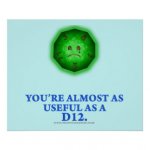Argyle King
Legend
Uhm... yes they areSimple is the opposite of complex. "Work as intended" is a separate thing, although clearly the more complex the game, the higher the chance of something not working as intended, in general.
In the context of rpgs, I'm not convinced it works out that way in general. Games which are described as 'rules-light' aren't always less complex than games which are described as 'rules-heavy.' Likewise, I don't think more complexity in games always leads to more cracks in a system. For example, while I'm sure there are many people who would argue that D&D 3.5 is/was a lighter game than something like BRP, GURPS, or HERO, I do not believe the former has less problems than any of the latter mentioned items.
On the same token, as far as D&D goes, I'd say that 4th Edition is a fairly light game; much lighter than 3.5 or Paizo's Pathfinder product, yet -in play; once the game starts moving forward- I feel (though I'm aware many disagree with me that) it can at times be much more complex to keep track of for some groups than the games I mentioned above.





